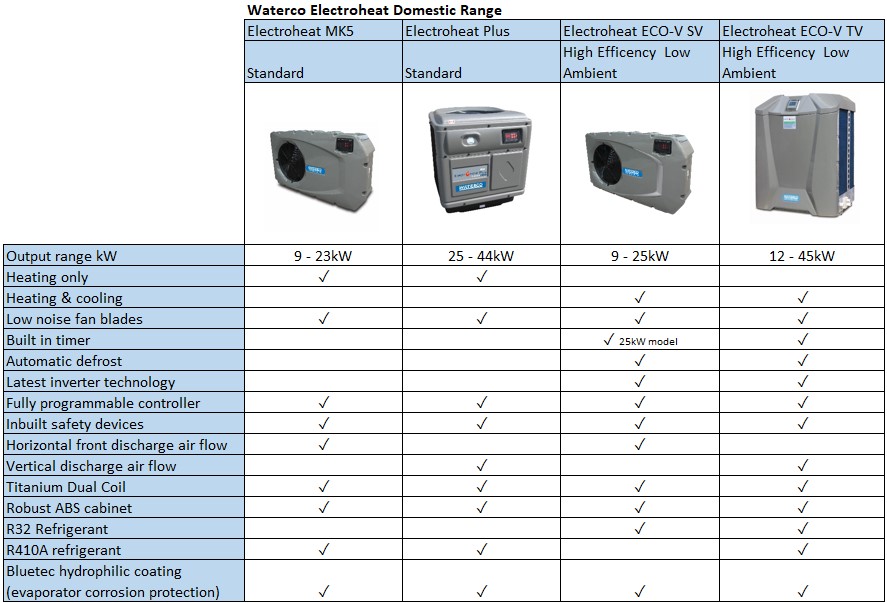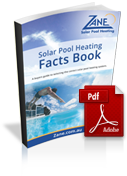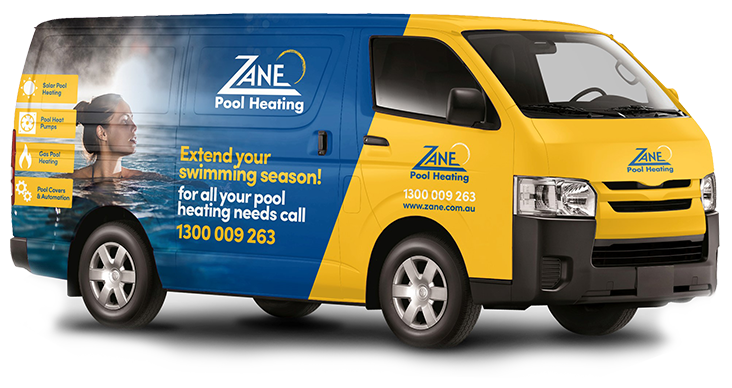Pool Heat Pump
Do you need a pool heat pump? Your pool serves as a source of enjoyment, and you want to continue using it during the year. Yet, the expense of running your old gas or electric pool heater makes it cost-prohibitive. You want to get the most enjoyment out of your backyard’s center piece instead of it sitting quietly, waiting for the warm temperatures to return.
The answer to your problem is clear. You need a new pool heat pump to bring the water temperature to a comfortable level without breaking the bank. Yet, your limited knowledge of swimming pool heat pumps leaves you wondering if there is a better option. Good news, technology has provided a great solution. Electroheat pool heat pumps will allow you to extend the swimming season or swim year round.
What is an Electroheat Pool Heat Pump?
So what is an Electroheat Pool Heat pump? They function using technology which remove latent heat from the surrounding air, intensifies it, and then transfers that heat to the pool. In a sense, it acts as an air conditioner in reverse. The process uses a highly effective refrigerant known as R410A or R32 that absorbs heat from the air pulled through the larger evaporator into the unit by a large fan. The warm refrigerant cycles through a heat exchanger which is fed water via a pump and then returns that heated water to the pool.
Comparatively, old fashion pool heaters run on gas or electricity and operate much like the water heater that warms the tap water in your home. In short, water pumped from the pool goes into a heat exchanger or tank. The exchanger is heated using gas or electricity, which heats the water and then returns it to the pool. However, they are expensive to run and require a great deal of maintenance.
Advantages of a larger evaporator area
Advantages of a larger evaporator area on a pool heat pump can provide several benefits:
Increased Heat Transfer:
Firstly, the primary function of an evaporator is to absorb heat from the surrounding environment and transfer it to the refrigerant. Additionally, a larger evaporator area allows for a greater surface area available for heat exchange, resulting in improved heat transfer efficiency. This means the heat pump can extract more heat from the air or water source and deliver it to the pool water.
Higher Heating Capacity:
Likewise, with a larger evaporator area a heat pump can extract a greater amount of heat energy from the environment per unit of time. Consequently, this leads to higher heating capacity, allowing the heat pump to heat the pool water more quickly and efficiently. It can be particularly beneficial in colder climates or during periods of lower ambient temperatures when more heat extraction is required.
Improved Performance in Low Temperatures:
Pool heat pumps rely on the temperature difference between the heat source (air or water) and the pool water to operate effectively. When in colder conditions and the temperature differential is smaller, a larger evaporator area helps compensate for the reduced heat availability. It enables the heat pump to maintain its performance and heat the pool efficiently even when the ambient temperature drops.
Reduced Operating Costs:
Surprisingly, by utilizing a larger evaporator area the heat pump can extract more heat from the environment, reducing the workload on the compressor and other components. This can lead to improved energy efficiency and lower operating costs. The heat pump can achieve the desired pool temperature more efficiently, resulting in reduced energy consumption and potentially lower utility bills.
Enhanced Durability and Reliability:
Hence, a larger evaporator area allows for better heat distribution and can help prevent uneven heat transfer, which could lead to hotspots or stress on certain components. With improved heat distribution, the heat pump is less likely to experience excessive wear and tear, increasing its overall durability and reliability.
The Advantages of a pool heat pump
Accordingly, there are several distinct advantages of using Electroheat pool heat pumps to warm your swimming pool. First and foremost is the cost. Also, Electroheat pool heat pumps are made with energy efficiency in mind and are between 50 to 80 percent cheaper to operate than natural or propane gas pumps and over 500% less expensive than electric element heaters.
Waterco’s Electroheat pool heat pumps have weatherproof casings which resist the elements, and unlike solar heaters, are not dependent on the sun, nor do they require the replacement of bulky propane gas cylinders.
Environmental Benefits
Electroheat pool heat pumps are amazingly energy-efficient and use a fraction of the power that their gas and electric counterparts utilize to operate. The R32 or R410A refrigerant does not impact the ozone layer, and the only thing expelled from the unit is the cold air that dissipates harmlessly into the atmosphere. There are no harmful or noxious gasses emitted near your pool area.
Should I Use a Pool Cover?
Even when using Electroheat technology to reduce your energy use, there are additional methods to bring down your energy bill. One of the most effective ways is the use of a swimming pool cover.
Pool covers help trap the heat in your water. Covered swimming pools will lose heat at a two to three times slower rate than an uncovered pool, thus reducing the need to run your heat pump and lowering your energy consumption.
What is the Best Location for the Electroheat Pool Heat Pump?
It may seem unimportant, but the location of your Electroheat pool heat pump is vital. The closer your pump is placed to the pool, the less energy it requires to transfer the water to the system.
When getting ready to install your heat pump, look for the closest option. Take into account the location of your electrical supply to make the most efficient choice.
Is There a Minimum Ambient Temperature for Operation?
The Electroheat Heat Pump derives heat from the air surrounding it. Therefore the air must have a certain level of heat that can be extracted by the refrigerant.
It is best to operate your Electroheat Pool Heat Pump when the ambient air temperature is above 10 degrees Celsius, however, there are models like the ECO-V range which will operate in cooler ambient conditions
What Are My Options?
When choosing an Electroheat pool heat pump, it is essential to assess your needs. Pool size, desired use, and functionality are crucial information to have before making your purchase. Fortunately, several options are available that will fulfill most requirements.
Electroheat pool heat pumps are designed to run during the filtering cycles of your pool. They range between 8 to 12 hours a day of operational use. Though they are more efficient, Electroheat pool heat pumps will take a little longer than gas pool heaters to attain the desired water temperature.
Making the Right Choice
Before deciding what model of Electroheat pool heat pump is right for you, do your research. Take into account your current and desired pool usage. Understand your area’s weather patterns, and of course, calculate the size of the pool or spa you need to heat.
Once you have all the information, you can talk to your Zane Pool Heating dealer, who will be happy to advise you on the appropriate choice to meet your needs. Electroheat swimming pool heat pumps are the most advanced, efficient, and eco-friendly swimming pool heating technology on the market. When installed, you are guaranteed to have your swimming season extended and that your pool will once again be the centerpiece of your backyard.


Solar Pool Heating Facts Book
A buyers guide to selecting the correct solar pool heating system.
(100% Free – Instant PDF Download)
*Your privacy is important and your information will not be shared







